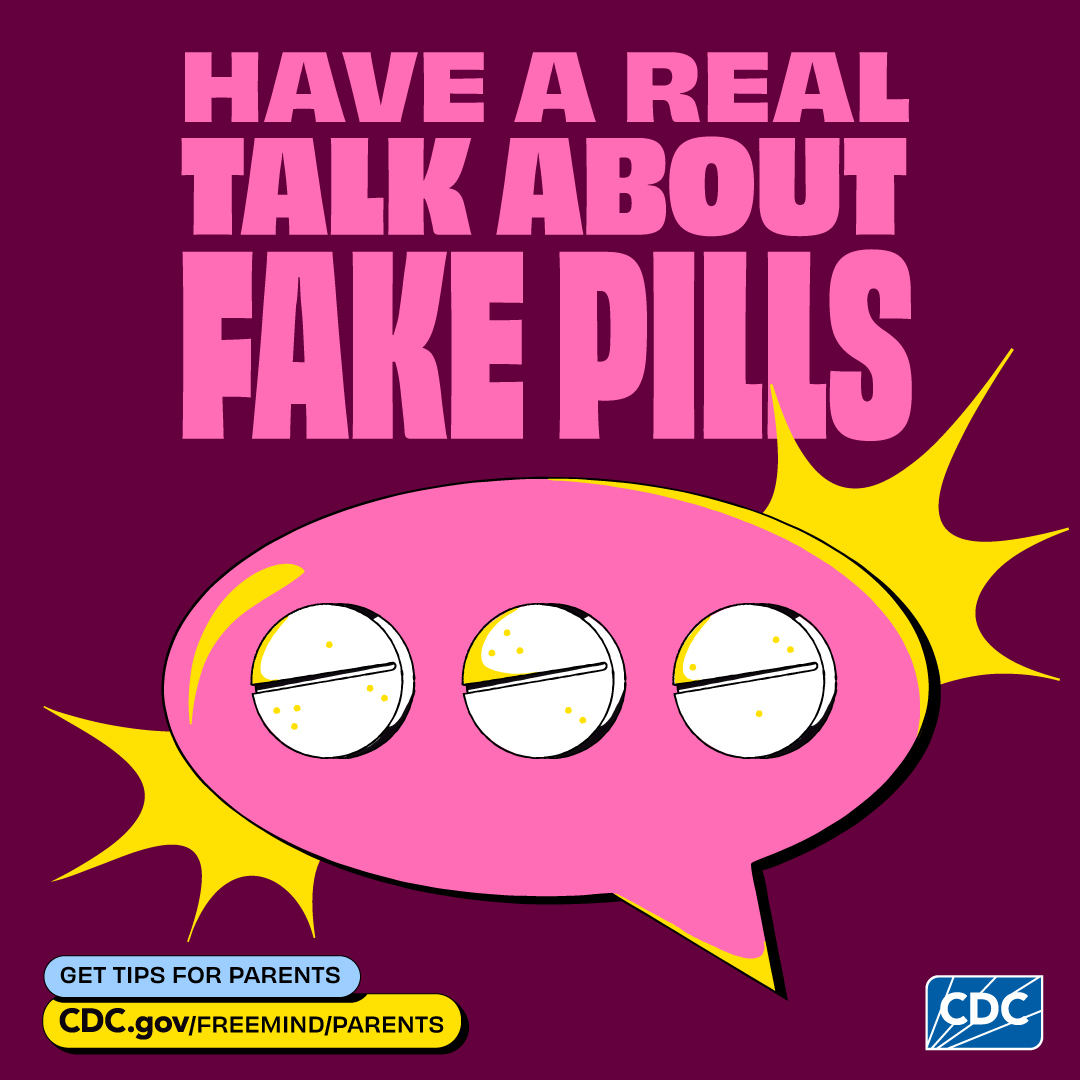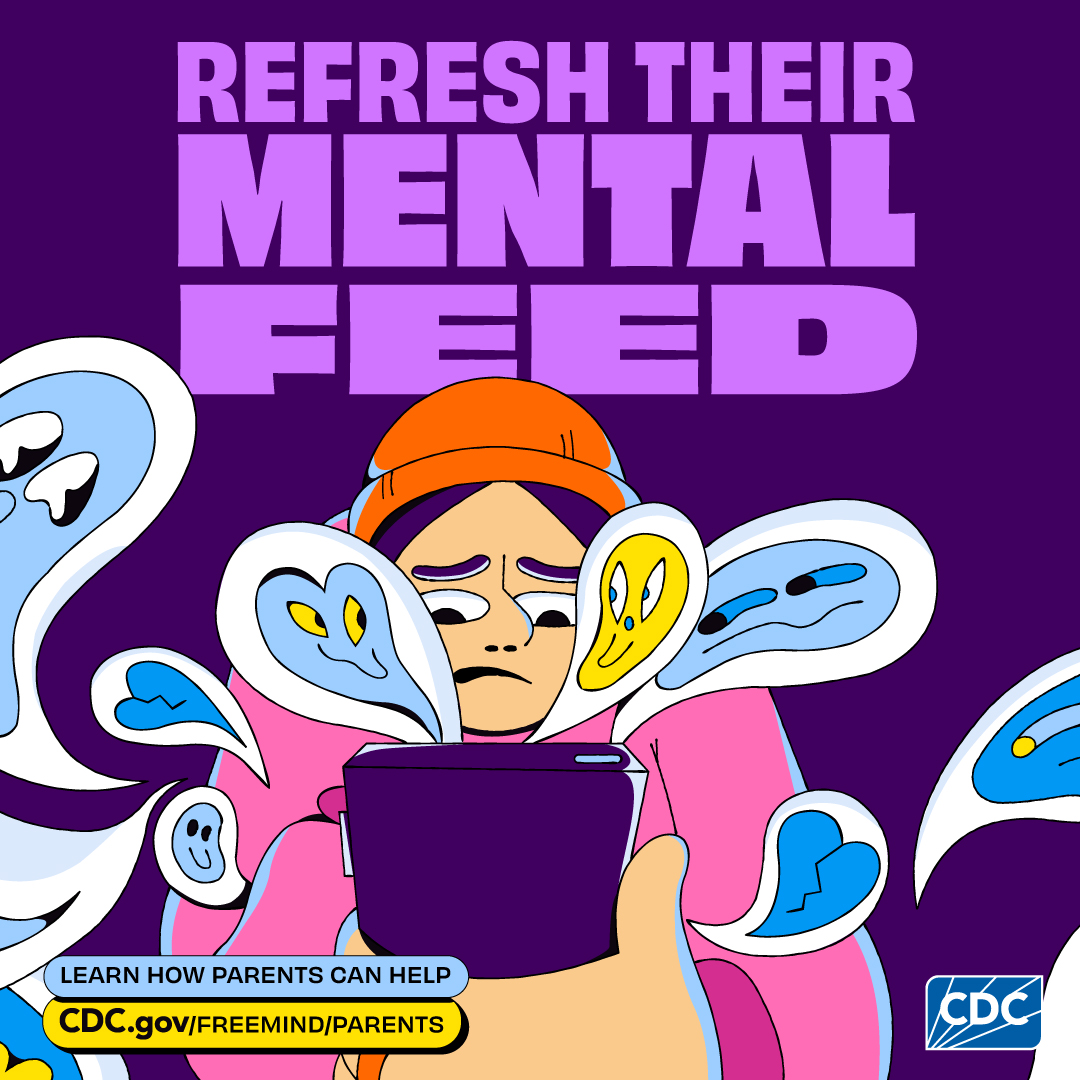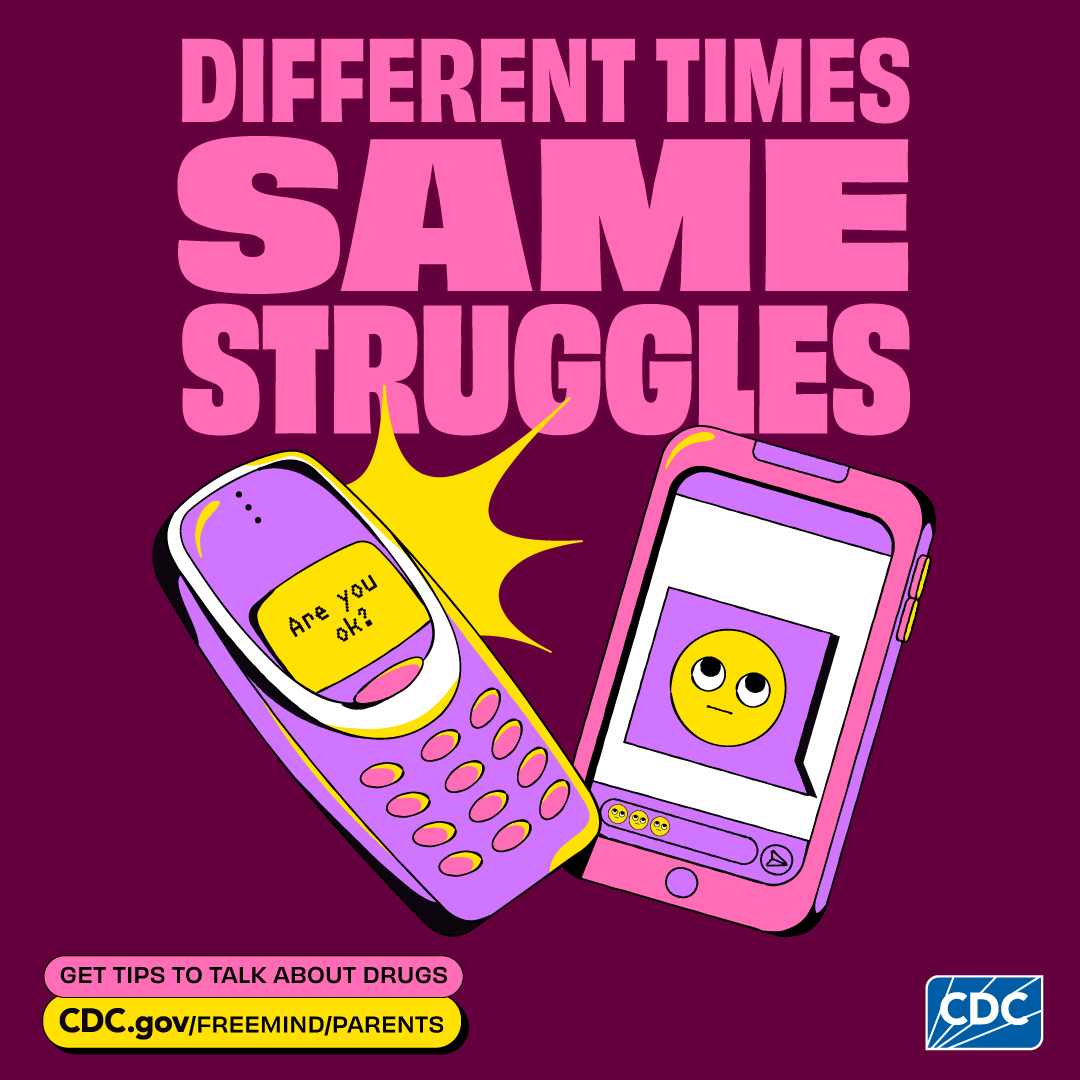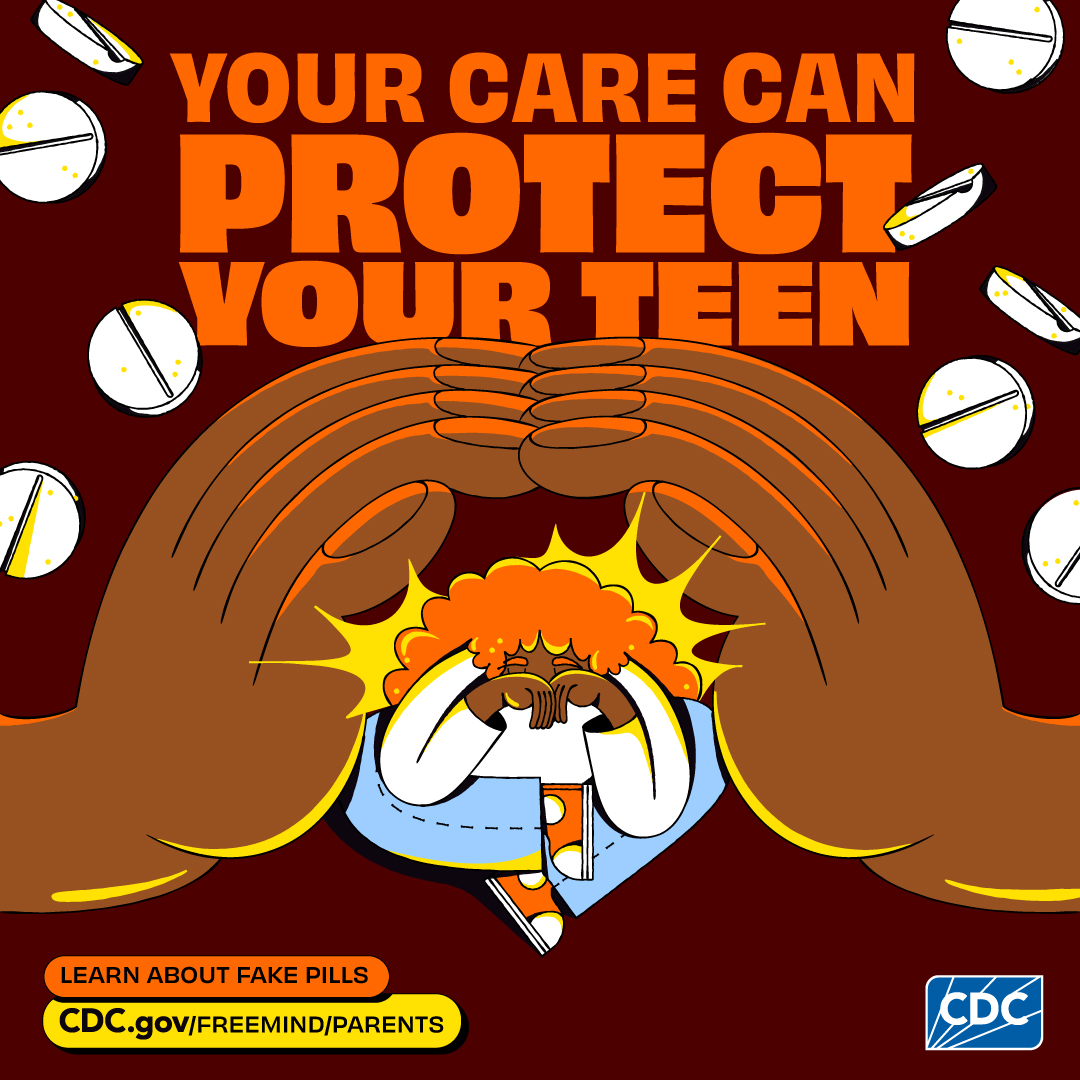Campaign Toolkit

About the Campaign
The Free Mind campaign was created to raise awareness about the connection between youth substance use and mental health.
The goals of the Free Mind campaign are to:
- Prevent substance use initiation, substance use, overdose, and related harms among youth.
- Educate youth on specific risks related to substance use, addiction, and overdose.
- Articulate the impacts that mental and behavioral health issues have on youth as they relate to substance use, prescription drug misuse, overdose, and addiction.
- Encourage youth to take responsibility for the aspects of their lives within their control and make healthy decisions.
- Equip those who influence youth with tools and information to help effect positive change.
Through nationwide discussions with youth and their parents/caregivers, CDC discovered that youth were more comfortable discussing the topic of mental health than substance use, even though they had a thoughtful understanding of the link between the two. When talking about substance use in connection with mental health, there was more openness on both topics, including the difficulty of asking for help and talking to friends and family about their struggles with these issues. These discussions resulted in a clear need for more resources and awareness about substance use and mental health challenges for youth and their parents/caregivers.
Amplify the campaign in your community
Join us as a partner in the Free Mind campaign and help prevent substance use and overdose among youth ages 12-17 by using and sharing the content below.
“It’s okay to not be okay,” a key appeal to youth from CDC’s newest campaign effort to connect young people to resources on mental health, substance use, and drug overdose prevention. In support of this mission, CDC has launched the Free Mind campaign —a research-based initiative designed to educate youth on the impact of substance use and promote open conversations with their parents and caregivers about mental health challenges.
Recognizing that substance use disorders can co-occur with mental health conditions like anxiety and depression, it is essential to provide teens with the tools to navigate these challenges. Breaking the stigma surrounding mental health and substance use can encourage more young people to seek the support they need and help to prevent overdose deaths. Learn more about the Free Mind campaign by visiting www.cdc.gov/freemind.
If you or someone you know is struggling, call or text the Suicide and Crisis Lifeline at 988 for free and confidential support.
Use these sample social media posts and graphics to promote CDC’s Free Mind campaign.
For Youth
Post Content
Post Content
Graphic
Graphic
Drugs and your body have a toxic relationship. They can damage your organs, twist your mental health, and make you feel like a stranger in your own skin. Ditch the drama and learn more about drugs’ toxic behaviors at cdc.gov/FreeMind.
#FreeMind
#OverdoseAwareness
Drugs and your body have a toxic relationship. They can damage your organs, twist your mental health, and make you feel like a stranger in your own skin. Ditch the drama and learn more about drugs’ toxic behaviors at cdc.gov/FreeMind.
#FreeMind
#OverdoseAwareness
Big feelings tying you up in knots? You might look to drugs like [insert a depressant that is commonly used in your community] to help you unwind. But how you deal with stress today makes a difference tomorrow. Learn better ways to work out the kinks at cdc.gov/FreeMind.
#FreeMind
#YourMentalHealthMatters
Big feelings tying you up in knots? You might look to drugs like [insert a depressant that is commonly used in your community] to help you unwind. But how you deal with stress today makes a difference tomorrow. Learn better ways to work out the kinks at cdc.gov/FreeMind.
#FreeMind
#YourMentalHealthMatters
Your feed looks picture perfect. But behind the filter, you might be struggling with your mental health and look to drugs like [insert a substance that is commonly used in your community] to keep up the aesthetic. Whatever is going on, you don’t have to handle it alone. Learn how to ask for help and find support at cdc.gov/FreeMind.
#FreeMind
#YouthMentalHealth
#YourMentalHealthMatters
Your feed looks picture perfect. But behind the filter, you might be struggling with your mental health and look to drugs like [insert a substance that is commonly used in your community] to keep up the aesthetic. Whatever is going on, you don’t have to handle it alone. Learn how to ask for help and find support at cdc.gov/FreeMind.
#FreeMind
#YouthMentalHealth
#YourMentalHealthMatters
Just because you’ve done it once, doesn’t mean you’ll be safe again. Using pills that aren’t prescribed to you is dangerous. Get tips to protect yourself and your friends at cdc.gov/FreeMind.
#DrugFreeMind
#OverdoseAwareness
#FreeMind
Just because you’ve done it once, doesn’t mean you’ll be safe again. Using pills that aren’t prescribed to you is dangerous. Get tips to protect yourself and your friends at cdc.gov/FreeMind.
#DrugFreeMind
#OverdoseAwareness
#FreeMind
For Parents/Caregivers
Post Content
Post Content
Graphic
Graphic
When teens use drugs to cope with life’s challenges, they’re at risk of taking fake pills. Fake pills can often contain fentanyl, a synthetic opioid that’s up to 50 times stronger than heroin and 100 times stronger than morphine. It only takes a tiny amount to cause a fatal overdose.
Keep your teen safe and have a real conversation about drugs’ toxic behaviors at CDC.gov/FreeMind/Parents
#DrugFreeMind #OverdoseAwareness
When teens use drugs to cope with life’s challenges, they’re at risk of taking fake pills. Fake pills can often contain fentanyl, a synthetic opioid that’s up to 50 times stronger than heroin and 100 times stronger than morphine. It only takes a tiny amount to cause a fatal overdose.
Keep your teen safe and have a real conversation about drugs’ toxic behaviors at CDC.gov/FreeMind/Parents
#DrugFreeMind #OverdoseAwareness

Social Media
Download [1080×1080 px]
Download [1200×675 px]

Social Media
Download [1080×1080 px]
Download [1200×675 px]
Your teen needs you. As a parent, it’s important to understand your teens’ risks for substance use and mental health challenges. By educating yourself, you can share what you learn with the teens in your life, be better prepared to answer their questions, know how to help them find trustworthy resources, and be the bridge to their success.
Visit CDC.gov/FreeMind/Parents to learn more.
#DrugFreeMind #OverdoseAwareness
Your teen needs you. As a parent, it’s important to understand your teens’ risks for substance use and mental health challenges. By educating yourself, you can share what you learn with the teens in your life, be better prepared to answer their questions, know how to help them find trustworthy resources, and be the bridge to their success.
Visit CDC.gov/FreeMind/Parents to learn more.
#DrugFreeMind #OverdoseAwareness

Social Media
Download [1080×1080 px]
Download [1200×675 px]

Social Media
Download [1080×1080 px]
Download [1200×675 px]
Constant chatter from social media can have a negative impact on your teen. The number of teens reporting poor mental health has increased over the past decade. In 2023, 40% of high school students stopped regular activities because of constant feelings of sadness or hopelessness.
Discover new tools to help your teen cope at CDC.gov/FreeMind/Parents.
#DrugFreeMind #YouthMentalHealth
Constant chatter from social media can have a negative impact on your teen. The number of teens reporting poor mental health has increased over the past decade. In 2023, 40% of high school students stopped regular activities because of constant feelings of sadness or hopelessness.
Discover new tools to help your teen cope at CDC.gov/FreeMind/Parents.
#DrugFreeMind #YouthMentalHealth

Social Media
Download [1080×1080 px]
Download [1200×675 px]

Social Media
Download [1080×1080 px]
Download [1200×675 px]
Want to connect with your teen?
- Educate yourself about the issues in their life.
- Have honest conversations – real talks make a real difference.
- Lead with empathy and acknowledge their emotions. Create a judgement-free zone to give them the freedom to open up.
It all starts with connection. Learn more ways to connect with your teen at CDC.gov/FreeMind/Parents.
#DrugFreeMind #YouthMentalHealth
Want to connect with your teen?
- Educate yourself about the issues in their life.
- Have honest conversations – real talks make a real difference.
- Lead with empathy and acknowledge their emotions. Create a judgement-free zone to give them the freedom to open up.
It all starts with connection. Learn more ways to connect with your teen at CDC.gov/FreeMind/Parents.
#DrugFreeMind #YouthMentalHealth

Social Media
Download [1080×1080 px]
Download [1200×675 px]

Social Media
Download [1080×1080 px]
Download [1200×675 px]
“It’s not about what has happened in the past. You need to be aware of it, but you need to focus on what you can do and help to change it going forward.” – Steve, a parent from Arizona.
If your child is using drugs or mentally struggling, getting involved early can make all the difference.
Find tools and resources at cdc.gov/FreeMind/Parents.
“It’s not about what has happened in the past. You need to be aware of it, but you need to focus on what you can do and help to change it going forward.” – Steve, a parent from Arizona.
If your child is using drugs or mentally struggling, getting involved early can make all the difference.
Find tools and resources at cdc.gov/FreeMind/Parents.

Social Media
Download [1080×1080 px]
Download [1200×675 px]

Social Media
Download [1080×1080 px]
Download [1200×675 px]
Use these sample social media posts and graphics to promote CDC’s Free Mind campaign.
Title
Title
Script
Script
Connection between mental health and substance use message
:30
Connection between mental health and substance use message
:30
When you’re feeling stressed out, overwhelmed, or depressed, you might think using drugs like [insert 1 – 2 substances that are commonly used in your community] will help get through today. And not think about the consequences.
But there’s a better way.
To know that it’s okay to not be okay and ask for help.
To become your best self.
Take care of your mind and body and reduce the risk for overdose and addiction.
Find a better way at cdc.gov/FreeMind.
When you’re feeling stressed out, overwhelmed, or depressed, you might think using drugs like [insert 1 – 2 substances that are commonly used in your community] will help get through today. And not think about the consequences.
But there’s a better way.
To know that it’s okay to not be okay and ask for help.
To become your best self.
Take care of your mind and body and reduce the risk for overdose and addiction.
Find a better way at cdc.gov/FreeMind.
Connection between mental health and substance use message
:15
Connection between mental health and substance use message
:15
It’s okay not to be okay.
But when you’re going through it, you might look to drugs [or insert 1 – 2 substances that are commonly used in your community to replace “drugs”] to help you cope.
The truth is taking drugs just creates new problems.
There’s a better way to deal.
Find healthy ways to cope at cdc.gov/FreeMind.
It’s okay not to be okay.
But when you’re going through it, you might look to drugs [or insert 1 – 2 substances that are commonly used in your community to replace “drugs”] to help you cope.
The truth is taking drugs just creates new problems.
There’s a better way to deal.
Find healthy ways to cope at cdc.gov/FreeMind.
Learn more about the Free Mind campaign with these additional resources for partners.
Campaign Development Summary
Learn more about how the Free Mind campaign was developed.
Roundtable Facilitators Guides
Learn how to host roundtable conversations with youth as well as parents and caregivers. These insights can help you determine which Free Mind messages resonate with your community and meet their needs.



